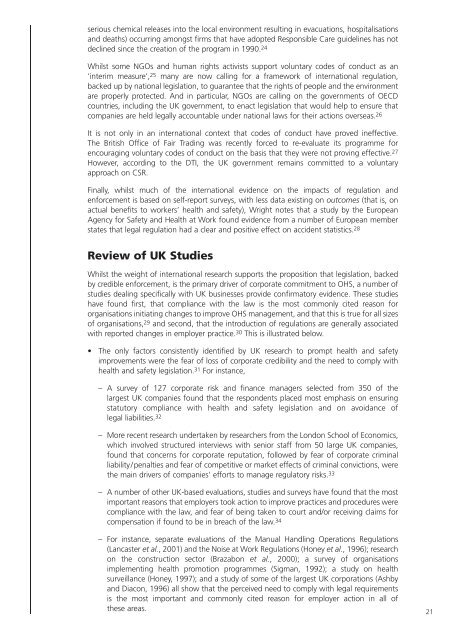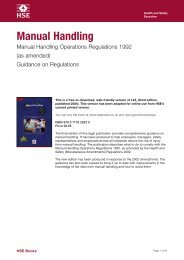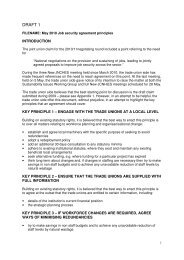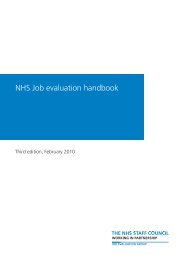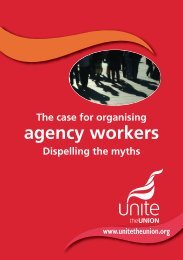Making Companies Safe - what works? (CCA ... - Unite the Union
Making Companies Safe - what works? (CCA ... - Unite the Union
Making Companies Safe - what works? (CCA ... - Unite the Union
Create successful ePaper yourself
Turn your PDF publications into a flip-book with our unique Google optimized e-Paper software.
serious chemical releases into <strong>the</strong> local environment resulting in evacuations, hospitalisations<br />
and deaths) occurring amongst firms that have adopted Responsible Care guidelines has not<br />
declined since <strong>the</strong> creation of <strong>the</strong> program in 1990. 24<br />
Whilst some NGOs and human rights activists support voluntary codes of conduct as an<br />
‘interim measure’, 25 many are now calling for a framework of international regulation,<br />
backed up by national legislation, to guarantee that <strong>the</strong> rights of people and <strong>the</strong> environment<br />
are properly protected. And in particular, NGOs are calling on <strong>the</strong> governments of OECD<br />
countries, including <strong>the</strong> UK government, to enact legislation that would help to ensure that<br />
companies are held legally accountable under national laws for <strong>the</strong>ir actions overseas. 26<br />
It is not only in an international context that codes of conduct have proved ineffective.<br />
The British Office of Fair Trading was recently forced to re-evaluate its programme for<br />
encouraging voluntary codes of conduct on <strong>the</strong> basis that <strong>the</strong>y were not proving effective. 27<br />
However, according to <strong>the</strong> DTI, <strong>the</strong> UK government remains committed to a voluntary<br />
approach on CSR.<br />
Finally, whilst much of <strong>the</strong> international evidence on <strong>the</strong> impacts of regulation and<br />
enforcement is based on self-report surveys, with less data existing on outcomes (that is, on<br />
actual benefits to workers’ health and safety), Wright notes that a study by <strong>the</strong> European<br />
Agency for <strong>Safe</strong>ty and Health at Work found evidence from a number of European member<br />
states that legal regulation had a clear and positive effect on accident statistics. 28<br />
Review of UK Studies<br />
Whilst <strong>the</strong> weight of international research supports <strong>the</strong> proposition that legislation, backed<br />
by credible enforcement, is <strong>the</strong> primary driver of corporate commitment to OHS, a number of<br />
studies dealing specifically with UK businesses provide confirmatory evidence. These studies<br />
have found first, that compliance with <strong>the</strong> law is <strong>the</strong> most commonly cited reason for<br />
organisations initiating changes to improve OHS management, and that this is true for all sizes<br />
of organisations, 29 and second, that <strong>the</strong> introduction of regulations are generally associated<br />
with reported changes in employer practice. 30 This is illustrated below.<br />
• The only factors consistently identified by UK research to prompt health and safety<br />
improvements were <strong>the</strong> fear of loss of corporate credibility and <strong>the</strong> need to comply with<br />
health and safety legislation. 31 For instance,<br />
– A survey of 127 corporate risk and finance managers selected from 350 of <strong>the</strong><br />
largest UK companies found that <strong>the</strong> respondents placed most emphasis on ensuring<br />
statutory compliance with health and safety legislation and on avoidance of<br />
legal liabilities. 32<br />
– More recent research undertaken by researchers from <strong>the</strong> London School of Economics,<br />
which involved structured interviews with senior staff from 50 large UK companies,<br />
found that concerns for corporate reputation, followed by fear of corporate criminal<br />
liability/penalties and fear of competitive or market effects of criminal convictions, were<br />
<strong>the</strong> main drivers of companies’ efforts to manage regulatory risks. 33<br />
– A number of o<strong>the</strong>r UK-based evaluations, studies and surveys have found that <strong>the</strong> most<br />
important reasons that employers took action to improve practices and procedures were<br />
compliance with <strong>the</strong> law, and fear of being taken to court and/or receiving claims for<br />
compensation if found to be in breach of <strong>the</strong> law. 34<br />
– For instance, separate evaluations of <strong>the</strong> Manual Handling Operations Regulations<br />
(Lancaster et al., 2001) and <strong>the</strong> Noise at Work Regulations (Honey et al., 1996); research<br />
on <strong>the</strong> construction sector (Brazabon et al., 2000); a survey of organisations<br />
implementing health promotion programmes (Sigman, 1992); a study on health<br />
surveillance (Honey, 1997); and a study of some of <strong>the</strong> largest UK corporations (Ashby<br />
and Diacon, 1996) all show that <strong>the</strong> perceived need to comply with legal requirements<br />
is <strong>the</strong> most important and commonly cited reason for employer action in all of<br />
<strong>the</strong>se areas. 21


